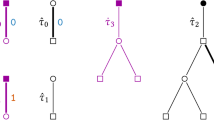Abstract
Random instances are widely used as benchmarks in evaluating algorithms for finite-domain constraint satisfaction problems (CSPs). We present an analysis that shows why deciding satisfiability of instances from some distributions is challenging for current complete methods. For a typical random CSP model, we show that when constraints are not too tight almost all unsatisfiable instances have a structural property which guarantees that unsatisfiability proofs in a certain resolution-like system must be of exponential size. This proof system can efficiently simulate the reasoning of a large class of CSP algorithms which will thus have exponential running time on these instances.
Access this chapter
Tax calculation will be finalised at checkout
Purchases are for personal use only
Preview
Unable to display preview. Download preview PDF.
Similar content being viewed by others
References
D. Achlioptas, P. Beame, and M. Molloy. A sharp threshold in proof complexity. In Proc., 33rd Annual ACM Symp. on the Theory of Computing (STOC-01), pages 337–346, 2001.
D. Achlioptas, L. Kirousis, E. Kranakis, D. Krizanc, M. Molloy, and Y. Stamatiou. Random constraint satisfaction: A more accurate picture. Constraints, 6(4):329–344
R. Aharoni and N. Linial. Minimal unsatisfiable formulas and minimal non-two-colorable hypergraphs. J. of Combinatorial Theory, Series A, 43:196–204, 1986.
Andrew B. Baker. Intelligent Backtracking on Constraint Satisfaction Problems: Experimental and Theoretical Results. PhD thesis, University of Oregon, 1995.
P. Beame, R. Karp, T. Pitassi, and M. Saks. On the complexity of unsatisfiability proofs for random k-CNF formulas. In Proc., 30th Annual ACM Symp. on the Theory of Computing (STOC-98), pages 561–571, May 1998.
E. Ben-Sasson and A. Wigderson. Short proofs are narrow: Resolution made simple. In Proc., 31st Annual Symp. on the Theory of Computing (STOC-99), pages 517–526, May 1999. (Also appears as ECCC report TR99-022).
P. Cheesman, B. Kanefsky, and W. M. Taylor. Where the really hard problems are. In Proc., 12th Int’l. Joint Conf. on A. I. (IJCAI-91), 1991.
V. Chvátal and B. Reed. Mick gets some (the odds are on his side). In Proc. of the 33rd Symp. on the Foundations of Comp. Sci. (FOCS-92), pages 620–628, 1992.
V. Chvátal and E. Szemerédi. Many hard examples for resolution. Journal of the ACM, 35(4):759–768, 1988.
J. De Kleer. A comparison of ATMS and CSP techniques. In Proc. of the 11th Int’l. Joint Conf. on A. I. (IJCAI-89), pages 290–296, 1989.
R. Dechter. Enhancement schemes for constraint processing: Backjumping, learning, and cutset decomposition. Artificial Intelligence, 41:273–312, 1990.
R. Dechter and D. Frost. Backtracking algorithms for constraint satisfaction problems. Technical report, Dept. of Inf. & Comp. Sci., U. of California, Irvine, 1999.
J. Gashnig. Experimental case studies of backtrack vs. Waltz-type vs. new algorithms for satisficing assignment problems. In Proc. of the Canadian Artificial Intelligence Conference, pages 268–277, 1978.
I. P. Gent, E. MacIntyre, P. Prosser, B. M. Smith, and T. Walsh. Random constraint satisfaction: flaws and structure. Constraints, 6(4):345–372, October 2001.
O. Kullmann. Upper and lower bounds on the complexity of generalized resolution and generalized constraint satisfaction problems. Submitted, 2000.
A. K. Mackworth and E. C. Freuder. The complexity of some polynomial network consistency algorithms for constraint satisfaction problems. Artificial Intelligence, 25:65–73, 1985.
D.G. Mitchell. Hard problems for CSP algorithms. In Proc., 15th Nat. Conf. on Artificial Intelligence (AAAI-98), pages 398–405, 1998.
D. G. Mitchell. The Resolution Complexity of Constraint Satisfaction. PhD thesis, University of Toronto, 2002.
D.G. Mitchell. Constraint satisfaction and resolution. In preparation.
D. G. Mitchell, B. Selman, and H. J. Levesque. Hard and easy distributions of SAT problems. In Proc. of the 10th Nat. Conf. on A. I. (AAAI’92), pages 459–462, 1992.
M. Molloy. Models and thresholds for random constraint satisfaction problems. In Proc., 34th Annual Symp. on the Theory of Computing (STOC-02), pages 209–217. ACM, 2002.
P. Prosser. Hybrid algorithms for the constraint satisfaction problem. Computational Intelligence, 9(3):268–299, August 1993.
P. Prosser. An empirical study of phase transitions in binary constraint satisfaction problems. Artificial Intelligence, 81:81–109, 1996.
T. J. Schaefer. The complexity of satisfiability problems. In Proc., 10th Annual ACM Symp. on the Theory of Computing (STOC-78), pages 216–226. ACM, 1978.
Author information
Authors and Affiliations
Editor information
Editors and Affiliations
Rights and permissions
Copyright information
© 2002 Springer-Verlag Berlin Heidelberg
About this paper
Cite this paper
Mitchell, D.G. (2002). Resolution Complexity of Random Constraints. In: Van Hentenryck, P. (eds) Principles and Practice of Constraint Programming - CP 2002. CP 2002. Lecture Notes in Computer Science, vol 2470. Springer, Berlin, Heidelberg. https://doi.org/10.1007/3-540-46135-3_20
Download citation
DOI: https://doi.org/10.1007/3-540-46135-3_20
Published:
Publisher Name: Springer, Berlin, Heidelberg
Print ISBN: 978-3-540-44120-5
Online ISBN: 978-3-540-46135-7
eBook Packages: Springer Book Archive




